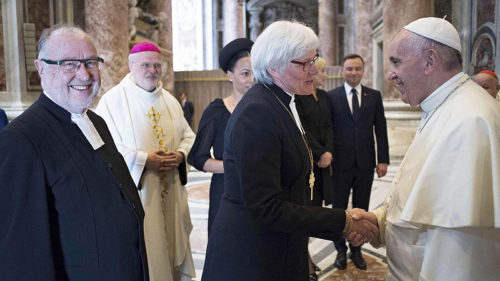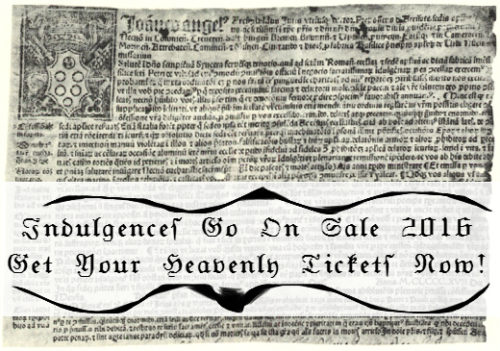The Pope visits Lund, the Oldest Metropolis In Scandinavia and celebrates an ecumenical service together with bishops and archbishops from Lutheran Scandinavia, celebrating the inauguration of the 500-year anniversary of the 95 theses, which Martin Luther posted in Wittenberg on the 31st of October.

In 1517 – on the 31st of October – Martin Luther posted 95 theses on the door of the church belonging to the Castle in Wittenberg. As he also mailed them to his Archbishop in Mainz, the theses – which were meant as in invitation to a local, academic debate – vibrated through wider ecclesiastical circles. As is well known, the theses ignited what later became known as the reformation and the following split between the Catholic Church and the Protestant North. At the core of the controversy was the theological split between a Catholic Church which continued to believe that justification in the Eyes of God can be bought through indulgencies – participation in masses, good acts, gifts, pilgrimages etc. – and a protestant church, which considers justification by faith as the only way to reach God. In the Lutheran perspective, God should not be regarded as a horse-dealer, who can be placated through wheeling and dealing or by the buying of indulgencies; instead, as Martin Luther famously phrased it: “Good works do not make a good man, but a good man does good works; evil works do not make a wicked man, but a wicked man does evil works.”
One of the consequences was the excommunication of Luther in 1520, a violent and often hateful theological climate carried through into the 20th century, religious wars, as well as a continued sacramental split. United in baptism, the Catholics continue to reserve the Bread and Wine for the righteous members of the Santa Ecclesia, while Lutherans continue to claim that justification cannot be reached though “good acts” (par excellence: the participation in a Roman-Catholic Mass). They believe that Justification in the eyes of God demands “only” faith, that is reaching out for the Love of God.
Doctrine of Justification

Theological talks to bridge this abyss have repeatedly been endeavoured, most recently in the work, which led to the Joint Declaration on the Doctrine of Justification, which was formally agreed to, by the Catholic Church’s Pontifical Council for Promoting Christian Unity and the Lutheran World Federation in 1999. However, among signatories missing were 35 members of the Lutheran World Federation. Among the Lutheran signatories advocating the Joint Declaration was Sweden. On the other hand, Denmark did not participate.
The reason was that the final agreed text underwent significant changes penned by Cardinal Ratzinger, the future Benedict XVI, which staunch Lutheran theologians (many of them Germans) could not accept. More specifically Ratzinger would not accept the sentence: “By grace alone, in faith in Christ’s saving work and not because of any merit on our part, we are accepted by God and receive the Holy Spirit, who renews our hearts while equipping us and calling us to good works.”
As is well-known it all ended up as yet another of those bureaucratic ecumenical endeavours beloved by a certain ilk of professional bureaucrats in the two churches enamoured by the same type of processes as we know of from for instance the UN.
Some of these had hoped that the celebration of the 5000-year anniversary of the Reformation might lead to a softening on this major theological controversy. However, when Benedict XVI (Ratzinger) visited the hometown of Erfurt in 2011, it was not felt by Lutherans to be a heart-warming and conciliatory experience.
From Conflict to Communion

Since then, however, Benedict has been pensioned off and the Catholic Church has a new Pope, Francis, who is obviously much more daring and open-minded. It is therefor with great pleasure The Lutheran World Federation and the Catholic Church will hold a joint commemoration of the Reformation on 31 October in Lund and Malmö, Sweden, under the theme From Conflict to Communion – Together in Hope.
The joint ecumenical event will take place in the city of Lund in anticipation of the 500th Reformation anniversary in 2017. It will – claims the two churches – highlight the solid ecumenical developments between Catholics and Lutherans and the joint gifts received through dialogue. The event will include a common worship based on the recently published Catholic-Lutheran “Common Prayer” liturgical guide. The Lund event is part of the reception process of the study document From Conflict to Communion, which was published in 2013, and has since been widely distributed to Lutheran and Catholic communities. The document is the first attempt by both dialogue partners to describe together at international level the history of the Reformation and its intentions. A cursory reading of the text does affirm its good intentions, but not the willingness to deal with the real contention between the Evangelical-Lutheran Churches and the Catholic Church. The new document basically reiterates the convoluted positions both parties wish to uphold: the different organisational structures (Papal infallibility and women as priests) and the different theologies (the question of justification) of the two churches.
Why Lund?
There is no doubt that the event takes place in Sweden, because it had a different reformational history than the rest of Scandinavia. For instance, the Church of Sweden – though no longer a State Church – has a tradition for a much more centralised organisation. While Denmark and Norway early on (in the 16th century) suspended the positions of Archbishops and even today continue to operate with the bishops of Oslo and Copenhagen as Primi inter Pares, Sweden sports an Archbishop, who is acknowledged as leader and spokesman of the collective Swedish church. As opposed to this, it is a constant issue to what extent the Bishops in the other Scandinavian churches have any rights to speak ex cathedra. This has resulted in the Swedish Church being more open for participation in ecumenical matters as well as a valued partner of the Catholic Church when dealing with Scandinavia.
Another reason is of course that the Cathedral in Lund is the oldest metropolis in Scandinavia. Read more about the History of Lund and the Cathedral here.
SOURCE:
Press Release: Joint Ecumenical Commemoration of the Reformation in Lund
READ ABOUT THE EVENT:
Joint Catholic-Lutheran Commemoration of the Reformation
READ MORE:
READ ALSO
 MEDIEVAL HISTORIES 2012: Austerity – a Protestant Revenge?
MEDIEVAL HISTORIES 2012: Austerity – a Protestant Revenge?
About Martin Luther in Erfurt and the Early days in the Reformation

